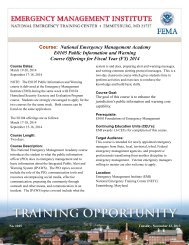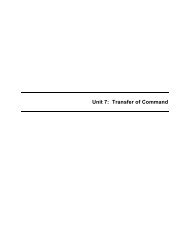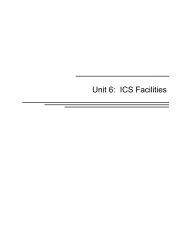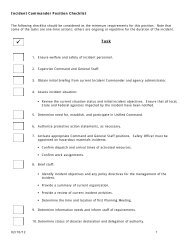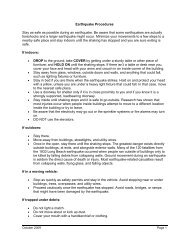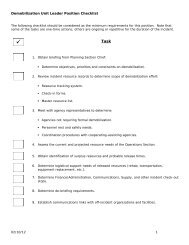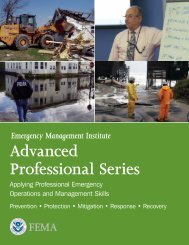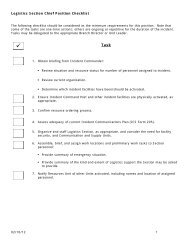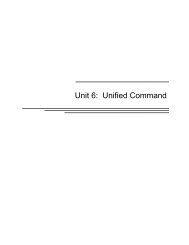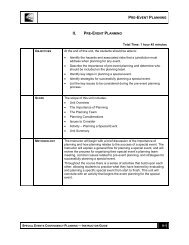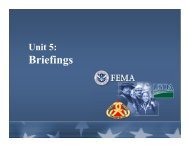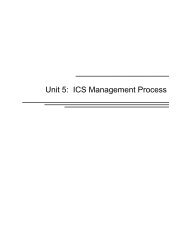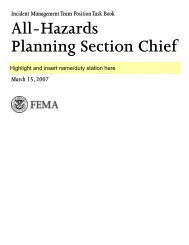Effective Communication - Emergency Management Institute ...
Effective Communication - Emergency Management Institute ...
Effective Communication - Emergency Management Institute ...
You also want an ePaper? Increase the reach of your titles
YUMPU automatically turns print PDFs into web optimized ePapers that Google loves.
UNIT 6: EFFECTIVE ORAL COMMUNICATION<br />
Before the Interview:<br />
Job Aid 6.1<br />
Tips for Media Interviews<br />
Track all media inquiries and note the reporter’s name, organization, date, and purpose.<br />
If possible, review the scope of the interview with the reporter before the interview so that you can<br />
anticipate what might be asked.<br />
Provide background information that helps the reporter understand the issues.<br />
Identify the points that you want to communicate during the interview and make sure these facts<br />
come to mind easily.<br />
Identify a message that you can incorporate into your first and last remark. For example, if the<br />
reporter opens the interview by saying, “Thanks for talking with us today,” you may respond, “I’m<br />
proud to speak on behalf of the community’s unified response effort,” or “Thank you for this<br />
opportunity to promote flood insurance.”<br />
Dress appropriately.<br />
During the Interview:<br />
Listen to the entire question before answering.<br />
Avoid speculation.<br />
Beware of false assumptions and erroneous conclusions.<br />
Avoid hypothetical questions.<br />
Be alert to multiple questions and address them individually.<br />
Be confident and concentrate on delivering your message.<br />
Keep your answers simple and direct.<br />
Speak in “sound bites” (i.e., concise, memorable, short statements).<br />
Never repeat inaccurate or damaging information spoken within a reporter’s question. Instead,<br />
restate the information in a positive manner in your answer.<br />
Do not refer to the reporter by name, as the reporter may not be included when the interview is aired.<br />
Treat all questions seriously.<br />
NEVER speak “off the record.”<br />
While answering questions, be attuned to opportunities to promote your message.<br />
If you are being recorded or taped and botch an answer, simply begin the answer again. If taped, the<br />
exchange will most likely be edited.<br />
Be aware of your appearance:<br />
• Avoid nervous gestures; do not overuse hand gestures.<br />
• Display good posture.<br />
• Maintain eye contact.<br />
• Ensure that your glasses (if you wear them) are not slipping downward.<br />
• Remove dark glasses.<br />
• Avoid wearing stripes, “busy” patterns, and red.<br />
• If seated, ensure that your jacket does not ride up behind your neck by sitting on the coattails.<br />
Leave all equipment concerns to the reporter or sound technician.<br />
After the Interview:<br />
Obtain and provide any information you promised to supply.<br />
Provide written background information, and be available to the reporter for follow-up questions.<br />
If the story is publicized with inaccuracies, call the reporter and politely point out the errors.<br />
<strong>Effective</strong> <strong>Communication</strong> Page 6.7



